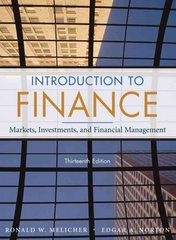Answered step by step
Verified Expert Solution
Question
1 Approved Answer
Its a Decision Modelling course. Is it possible to send me the actual word file and the excel sheet file in my email or here

Its a Decision Modelling course. Is it possible to send me the actual word file and the excel sheet file in my email or here for this answer. thanks
If you solve the models in Excel Solver, you will have to write them in standard form. i.e. all variables on the left-hand side and a number of the right-hand side. If you use LINGO. you are not bound by this restriction. For each question, do the following: (a) Formulate an algebraic model for the problem. Submit this in Word or pdf. (b) Use the Excel Solver or LINGO to solve this model. Submit the computer file. (c) State the solution in words. Submit this in Word or pdf. When you attempt to solve these models, you might receive a message about the solution being infeasible. While this is a theoretical possibility. it won't happen for any of these questions. It means that a mistake has been made in formulating the model. Each question is worth 20 marks. 3. A company which produces a single product has definite orders for this product over the next six months as follows: Month 1 2 3 4 5 6 Demand 350 680 475 590 460 390 The company ended the previous month (month 0) with an inventory of 200 units, and the previous month production level was 400 units. The company wishes to end this six-month planning period with an inventory of at least 50 units. It costs $3.50 per unit to increase the production level from one month to the next, and $6.00 per unit to decrease it. The cost of holding inventory from one month to the next is $4.80 per unit per month. No shortages are permitted. In each month. the company wants to produce an integer number of units. The company wishes to minimize the sum of production level change costs and inventory costs over the six-month planning horizon. If you solve the models in Excel Solver, you will have to write them in standard form. i.e. all variables on the left-hand side and a number of the right-hand side. If you use LINGO. you are not bound by this restriction. For each question, do the following: (a) Formulate an algebraic model for the problem. Submit this in Word or pdf. (b) Use the Excel Solver or LINGO to solve this model. Submit the computer file. (c) State the solution in words. Submit this in Word or pdf. When you attempt to solve these models, you might receive a message about the solution being infeasible. While this is a theoretical possibility. it won't happen for any of these questions. It means that a mistake has been made in formulating the model. Each question is worth 20 marks. 3. A company which produces a single product has definite orders for this product over the next six months as follows: Month 1 2 3 4 5 6 Demand 350 680 475 590 460 390 The company ended the previous month (month 0) with an inventory of 200 units, and the previous month production level was 400 units. The company wishes to end this six-month planning period with an inventory of at least 50 units. It costs $3.50 per unit to increase the production level from one month to the next, and $6.00 per unit to decrease it. The cost of holding inventory from one month to the next is $4.80 per unit per month. No shortages are permitted. In each month. the company wants to produce an integer number of units. The company wishes to minimize the sum of production level change costs and inventory costs over the six-month planning horizon Step by Step Solution
There are 3 Steps involved in it
Step: 1

Get Instant Access to Expert-Tailored Solutions
See step-by-step solutions with expert insights and AI powered tools for academic success
Step: 2

Step: 3

Ace Your Homework with AI
Get the answers you need in no time with our AI-driven, step-by-step assistance
Get Started


